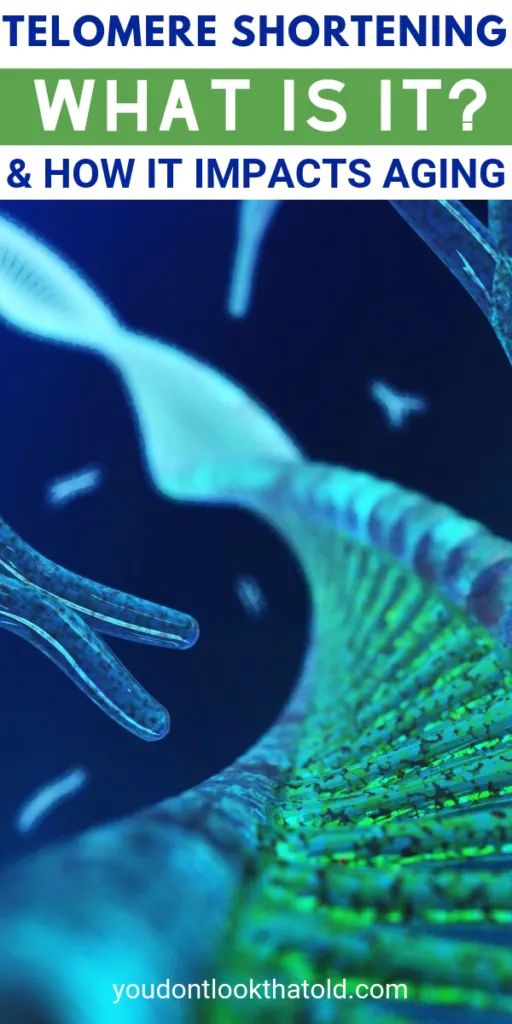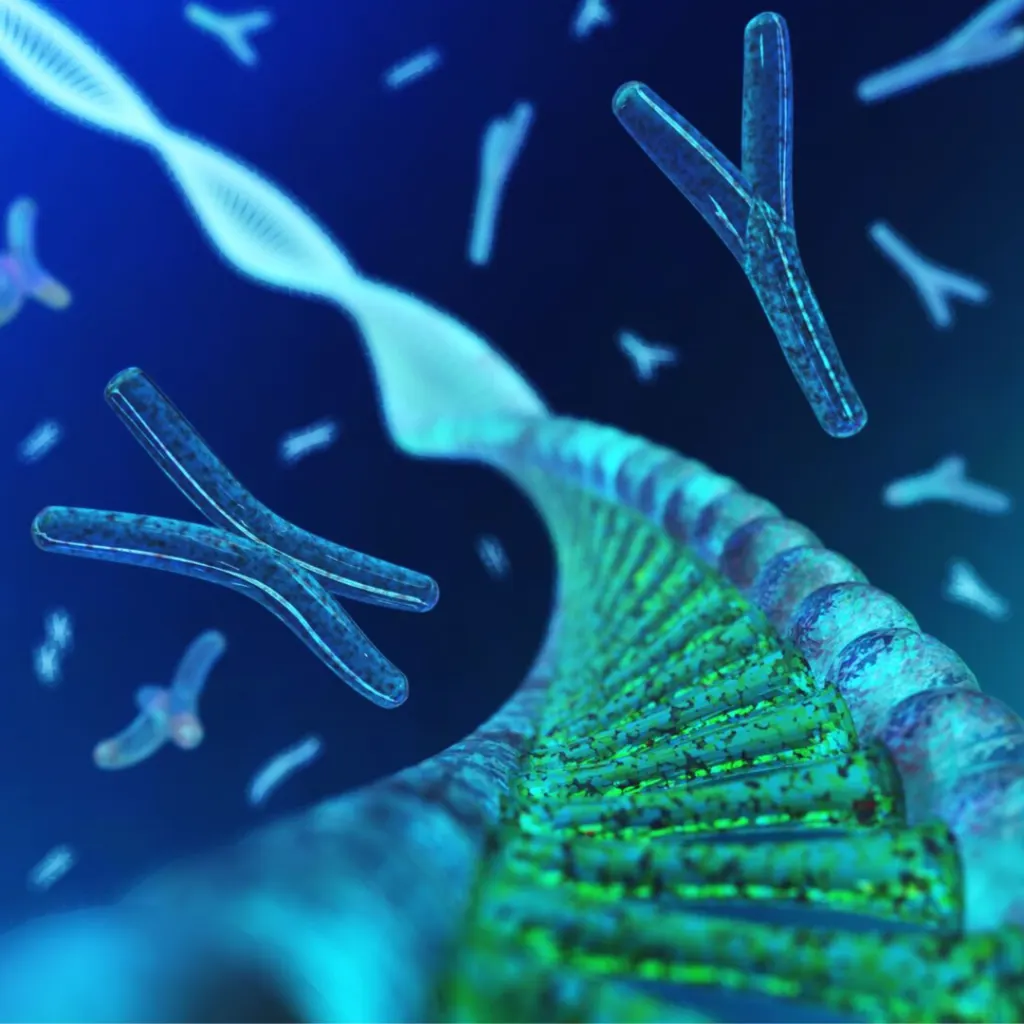If somebody offered you a way to stop the aging process, would you take it? As of yet, there’s no miracle of everlasting life, but scientists are getting better at understanding what causes us to grow old. The research around Telomere shortening is one part of that understanding.

Telomere Shortening and Aging
In 2010, a study from Harvard University found that telomere shortening has a significant impact on aging [1]. Each cell in your body contains DNA, the genetic material that cells must duplicate in order to multiply. DNA strands include nucleotides, which are like lines of code that tell your body how to function.
On either end of your strands of DNA is a telomere made of repetitive strands of nucleotides that don’t code for genetic information. Their function is to protect your DNA from damage. Think of telomeres as the caps on your shoelaces that prevent fraying.
Each time your cells replicate, the telomeres on your strands of DNA get shorter. Eventually, your DNA becomes damaged, and your cells can’t accurately copy their genetic material.
Related Read: 6 Reasons You Look Older
Telomerase: The Enzyme that Keeps Your DNA Healthy
Stem cells, cells in embryos, and cancer cells all contain telomerase, an enzyme that allows cells to replicate without shortening their telomeres.
Alexey Olovnikov first discovered telomerase in 1973 [2], and the enzyme is now a favorite topic of research for its potential ability to increase lifespan. Imagine if your cells could divide an infinite number of times without damage. It wouldn’t stop you from aging entirely (due to other causes of cellular breakdown), but it would likely slow it down. The downside is that no one knows, exactly, how activating telomerase would affect cancer development.
Stanford University Research
Scientists in the medical department of Stanford University have developed a way to lengthen the human telomere by as much as 1,000 nucleotides (up to 10%) [3]. This method increases the number of times cells can replicate without sustaining genetic damage. Treated cells behave like younger cells, although they don’t divide indefinitely. If reproduced without a signal to stop, they could become cancerous. Instead of stopping cellular death entirely, the treatment allows cells to divide several more times before genetic damage occurs.
According to Helen Blau, Ph.D., a professor of microbiology and immunology at Stanford University, the therapy developed could help treat diseases of aging such as Duchenne muscular dystrophy.

How Your Diet Can Prevent Telomere Breakdown
Although you can’t stop aging, you can slow the process with a healthy diet. The vitamins listed below all have research to support their ability to slow telomere shortening.
Vitamin B
The body needs B vitamins to metabolize the molecules responsible for creating DNA. Making sure you have adequate levels of your B vitamins, which are commonly deficient in adults, can help prevent telomere shortening and age-related disorders such as muscular dystrophy.
Research is particularly promising for vitamin B9 or folic acid. A study published in the Journal of Nutrition in 2009 found that people with the most substantial amount of dietary folic acid also had the longest telomeres [4]. Dietary sources of folic acid include spinach, kale, and avocado.
Related Read: Brain Fog 101
Vitamin D
A study published in the International Journal of Obesity in 2012 found that vitamin D supplementation increased the activation of telomerase activity by more than 19% in a group of obese individuals [5].
You can include more vitamin D in your diet by eating fatty fish and egg yolks. Your body can also synthesize vitamin D from cholesterol when you expose your skin to sunlight, so going out into the sun for a few minutes a day is critical to optimal health.

Vitamin C
A study published in 1998 found that vitamin C may decrease telomere shortening by up to 62% in cultures of human blood vessel cells [6].
Most citrus fruits contain vitamin C as well as spinach and bell peppers. Adding lemon juice to salads is a delicious way to add some vitamin C to your diet.
Vitamin E
Research shows that vitamin E helps to decrease chemical stress on your cells. Alpha-tocopherol, one of eight different forms of the vitamin, may drastically decrease telomere shortening according to a study published in the Journal of Cellular Biochemistry [7]. To increase your dietary vitamin E intake, eat more seeds, nuts, and dark greens.
Focus on a Vitamin-Rich Diet to Prevent Telomere Shortening
Aging science is an exciting field of research that’s still growing and has an impact on everyone’s lives. Although there are still tons of secrets left to discover about the body, people know that a healthy diet can slow the inevitable aging process.
To live a long life and optimize your genetic potential, make healthy, nutrient-dense foods staples in your diet. In particular, focus on eating foods rich in vitamins C, D, E, and B9.
Sources
1. M Jaskelioff, et al. Telomerase reactivation reverses tissue degeneration in aged telomerase-deficient mice. Nature, 2011, 469, p.102-107.
2. AM Olovnikov. A theory of marginotomy. The incomplete copying of template margin in enzymic synthesis of polynucleotides and biological significance of the phenomenon. Journal of Theoretical Biology, 1973, 41(1), p.181-90.
3. S Conger. Telomere extension turns back aging clock in cultured human cells, study finds, 2015. [Online] Available from: med.stanford.edu/news/all-news/2015/01/telomere-extension-turns-back-aging-clock-in-cultured-cells.html [Accessed 16 Aug 2018].
4. L Paul L, et al. Telomere length in peripheral blood mononuclear cells is associated with folate status in men. Journal of Nutrition, 2009, 139(7), p.1273-8.
5. H Zhu, et al. Increased telomerase activity and vitamin D supplementation in overweight African Americans. Nature, 2012, 36, p.805-809.
6. K Furumoto, E Inoue, N Nagao, et al. Age-dependent telomere shortening is slowed down by enrichment of intracellular vitamin C via suppression of oxidative stress. Life Sci, 1998, 63(11), p.935-48.
7. Y Tanaka, Y Moritoh, N Miwa. Age-dependent telomere-shortening is repressed by phosphorylated alpha-tocopherol together with cellular longevity and intracellular oxidative-stress reduction in human brain microvascular endotheliocytes. J Cell Biochem, 2007, 102(3), p.689-703.
